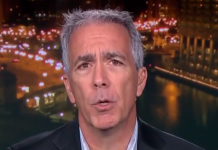Headlines from the Washington Post, Al Jazeera, and Reuters described the U.S. Senate’s Dec. 13 vote to pull support for Saudi Arabia in the war in Yemen as a “rebuke” of President Donald Trump. In countless more headlines, the word “defy” is used to describe the Senate refusing to paper over the murder of journalist Jamal Khashoggi and the brutal consequences of America continuing to fund the Saudi-UAE coalition in Yemen.
But rebuke is not the full story.
Before the vote began, Senate Majority Leader Mitch McConnell ran through the business of the day, of which the Yemen vote was only part. He touted some successes of the recently-passed $867 billion farm bill, which he claimed “support[s] farm families in the bluegrass,” including in his home state of Kentucky:
“For hundreds of thousands of Kentuckians faced with food insecurity, the farm bill increases funding for emergency programs at food banks,” said McConnell.
The Majority Leader’s zeal for relieving families facing food insecurity seemed to wane when those families were Yemeni. Shortly thereafter, he argued against the resolution that would end U.S. support for the war in Yemen, despite the fact that the collapse of the Yemeni currency has caused food prices to triple and famine is imminent.
Senator Marco Rubio of Florida also argued against the bill, arguing that the conflict was likely to continue with or without U.S. help, and likely to create a greater conflict that would draw in more U.S. troops:
“This conflict will continue irrespective of what we do, and the Saudis will have no problem buying weapons,” said Rubio. “One of the sad facts about the world today is countries have plenty of sources from which they can buy this weaponry, and plenty of countries and arms dealers that are willing to sell it to you.”
However, it is unclear whether or not the Florida senator’s prediction bears out in the long term, especially with U.S.-Saudi arms deals ramping up dramatically over the past nine years. According to Statista, the value of that weaponry over several years has been $110 billion, which would suggest Saudi Arabia’s growing dependence on the U.S. as its primary arms provider in the conflict in Yemen. Considering MBS’s tarnished image around the world following the murder of Khashoggi and Saudi Arabia’s inability to wage war without help, it is not at all obvious that the gulf country will have an easy time finding another supplier as reliable as the U.S.
Senator Bernie Sanders of Vermont gave a rousing defense of the bill, stating that Congress has not done due diligence regarding its war powers:
“For too many years, Congress has abdicated its historical and Constitutional responsibility to be the body that determines whether or not this country is at war,” said Senator Sanders. “Today I hope we begin the process of taking that back.”
However, Senator Cornyn of Texas raised an objection. For fear that forging ahead on this legislation would signal to Israel that the U.S. cannot be trusted to deliver on its promised support, Cornyn added an amendment stating that “nothing in the joint resolution shall be construed to influence or disrupt any military operations and cooperation with Israel.” The amendment passed 99 to 0.
It is remarkable that moments after giving sharp condemnation to Saudi Arabia over Khashoggi, Yemen, and a laissez-faire attitude towards violations of human rights, Senator Sanders, who is Jewish, voted for Cornyn’s Amendment, promising that Israel could still rely on support from the U.S., despite the long list of similar accusations against Israel.
In June 2018, the story of Razan al-Najjar, a 21-year-old Palestinian paramedic, went viral. While tending to wounded protesters in demonstrations dubbed as the “Great March of Return,” she was shot and killed by Israeli soldiers. Under the Geneva Convention, knowingly firing at a medic wearing clear insignia is a war crime. Videos show al-Najjar waving her hands in surrender to show that she was not armed. After she was dead, Israel went to work on assassinating her character, insinuating that she was not truly a medic, and that her death was the responsibility of Hamas, who organized the protest.

The message from the senators is clear: We protect who we wish to protect. Marco Rubio votes against the bill to protect U.S. troops from further conflict, ignoring that continuing support exposes thousands of Yemeni civilians to further conflict. Mitch McConnell develops empathy when it comes to farm families struggling to eat in the bluegrass, but fails to extend the same empathy when it comes to starving Yemeni families.
Bernie Sanders and Democrats vote for the bill, but assure Israel that despite the crimes they are accused of, U.S. support will continue. And all of Congress fails to meaningfully curtail the power of Saudi Arabia in the Yemen war that has gone on for three years and counting — until a well-connected journalist is brutally murdered for all the world to see.
While the vote is a rebuke of the president — who continues to run interference for the Saudi crown prince and whose son-in-law offered MBS advice on how to “weather the storm” of criticism that has followed him since Khashoggi’s murder — it does not display the moral clarity that the word would suggest.
Instead, it suggests that the protection of vulnerable populations by the legislative body of the most powerful country on Earth depends decisively on who you are.
Feature image provided via Pxhere











